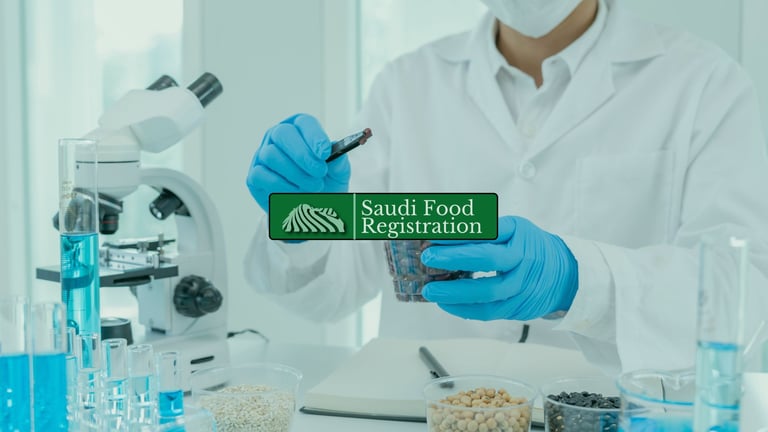KSA's Maximum Residue Limits: MRLs
Saudi Food Registration helps businesses comply with Saudi Arabia’s MRLs, ensuring food safety, regulatory approval, and risk management for smooth market entry
1/23/20252 min read


Understanding Saudi Arabia's Maximum Residue Limits (MRLs) for Food Safety
In the dynamic world of global food trade, navigating the intricate landscape of food safety regulations is crucial for businesses looking to succeed in the Saudi Arabian market.
Maximum Residue Limits (MRLs) stand at the forefront of ensuring food quality, protecting consumer health, and maintaining stringent safety standards.
What Are Maximum Residue Limits (MRLs)?
Maximum Residue Limits represent the highest legal concentration of chemical substances—including pesticides, veterinary drugs, and contaminants—permitted in food products.
These scientifically established thresholds play a critical role in:
Protecting public health by minimizing exposure to potentially harmful chemical residues.
Establishing clear guidelines for food producers and importers.
Creating a standardized framework for food safety assessment.
Ensuring transparency in food production and international trade.
Understanding MRLs is not just a regulatory requirement—it’s a fundamental aspect of responsible food production and distribution.
SFDA's Role in Regulating MRLs
The Saudi Food & Drug Authority (SFDA) serves as the primary regulatory body responsible for establishing and enforcing Maximum Residue Limits in the Kingdom. Their approach combines:
Comprehensive international guidelines from Codex Alimentarius.
Rigorous scientific research.
Localized regulatory frameworks tailored to Saudi Arabia's specific needs.
The SFDA's multilayered regulatory strategy ensures that:
Imported food products meet stringent safety standards.
Local producers adhere to consistent quality benchmarks.
Consumers receive protection through proactive monitoring and enforcement.
Key MRL Regulations & Testing Procedures
Saudi Arabia's MRL framework distinguishes between permitted and prohibited residues across multiple food categories:
Affected Food Categories
Fresh and processed fruits.
Vegetables.
Meat products.
Dairy.
Grains and cereals.
Processed food items.
Comprehensive Testing Protocols
The SFDA implements multi-stage testing procedures that include:
Pre-import laboratory analysis – Ensuring compliance before products enter the market.
Random sampling of food products – Conducted at ports and within the supply chain.
Advanced residue detection technologies – Used for precise identification of contaminants.
Continuous monitoring of production chains – Tracking compliance throughout the food lifecycle.
Non-compliance carries significant consequences, including:
Product recalls.
Import bans.
Financial penalties.
Potential legal actions.
Common Challenges in MRL Compliance
Businesses face several critical challenges when navigating Saudi Arabia's MRL landscape:
1. Strict Import Regulations
Challenge: Extremely rigorous MRL limits for imported food products.
Solution: Collaborate with specialized MRL testing and compliance experts before export.
2. Regulatory Variations
Challenge: Divergent MRL standards between Saudi Arabia and international markets.
Solution: Leverage regulatory intelligence platforms to ensure precise SFDA compliance.
3. Potential Shipment Rejections
Challenge: MRL violations leading to costly shipment rejections.
Solution: Implement comprehensive pre-export residue testing and robust supplier verification processes.
Best Practices for MRL Compliance in Saudi Arabia
To successfully navigate the complex MRL landscape, businesses should:
Conduct routine laboratory testing to detect and prevent residue violations.
Partner with regulatory consultants to ensure up-to-date compliance.
Maintain meticulous documentation for streamlined SFDA approvals.
Develop advanced traceability systems to track product safety.
Implement proactive risk assessment measures to prevent potential violations.
How Saudi Food Registration Can Support Your Compliance Journey
Saudi Food Registration offers specialized services designed to simplify your MRL compliance process:
Comprehensive MRL Testing – Ensuring your products meet SFDA’s exacting residue limits.
Regulatory Intelligence – Keeping you informed about evolving MRL policies.
Documentation Review – Verifying that product labels accurately reflect compliance status.
Related Reads
Master SFDA Labeling Standards – Learn how to meet Saudi Arabia’s strict labeling requirements and avoid compliance pitfalls.
Product Registration Crisis Guide – Strategies to overcome registration challenges and regulatory setbacks.
GCC Food Registration Made Easy – A step-by-step guide on food registration across the GCC region, simplifying compliance for businesses.
Registering alternative proteins in Saudi Arabia requires SFDA compliance, Halal certification, and expert support for market entry.
Learn how to register alternative proteins in MENAT with regulatory guidance and Halal certification.
